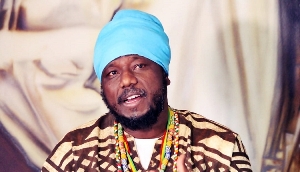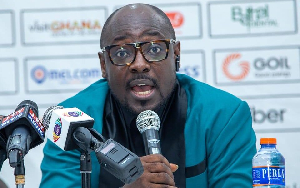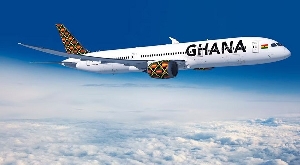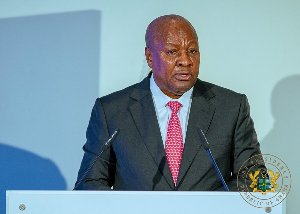At almost 63 years of age, Ghana's former president, Jerry John Rawlings, should be enjoying a comfortable retirement and not fighting for political relevance against the party he founded in 1991 and whose re-election he worked so hard for in December 2008. What is in the Rawlings make up that appears to make him a fighter without end? Rosemary Atiemo, has been looking into the archives, and has dug up a fascinating personal history of a man to whom fate has always been kind.
"Beware of Rawlings, he seldom loses his fights†appears to be the summary of the life history of the man who, at almost 63 years of age, is still engaged in an internecine struggle within his own party, the ruling National Democratic Congress (NDC), for political relevance, if not survival. His background presents an amazing tale of a man who has won more battles against the odds than he has lost. Even when his personal capabilities have woefully failed him, fate has always been kind in that other have ridden to his rescue.
His profile is rich enough to warrant a full-length book. But for the focus of this biography, we will restrict ourselves to his early years. Jerry John Rawlings was born in Accra on June 22, 1947. According to his official (and conventional) biography, "he is the son of a Ghanaian Ewe woman and a Scottish father.†But this is a claim which, despite the boldness of the conventional accounts, even his inner circle of friends and political allies are not prepared to be specific about.
His mother is a "Ghanaian Ewe" all right. But his father? Even members of his inner circle, including Kofi Awonoor, Chairman of the Council of State, are not so sure.
Awonoor, a former university lecturer, poet, politician and author of several books, was one of the intellectual pillars that kept Rawlings' PNDC and NDC governments afloat for 19 years “ from 2001 “ when Rawlings handed over power to President John Agyekum Kufuor. An Ewe like Rawlings himself, Awonoor wrote the book, “The Ghana Revolutionâ€, dedicated to the early turbulent years of the Rawlings era. In the book, Awonoor tried to solve the “mystery†of Rawlings’s paternity but ended up compounding it even more.
“Rawlings is a Ghanaian,†Awonoor wrote. “His father happened to be a Scotsman. His mother is an Ewe from the well known Agbotui family.†Awonoor is famous for his majestic prose and command of the English language. So he must know what he was writing about when he used a definite “is an Ewe†to describe Rawlings†mother, but “happened to be a Scotsman†in the case of his father. There is an air of finality about “is an Eweâ€, but not to about “happened to be a Scotsman.â€
One of the people who grew up with Rawlings and who really knows him inside out, from his boyhood to his days in the Ghana Air Force is Osahene (retired Major) Boakye Djan. In a 2001 interview with the London based New African magazine, Djan said Awonoor was caught up in his own contradictions.
“It is a paternity they don’t want to talk about,†Djan said. “Nobody knows Rawlings’ father for sure, except perhaps his mother. Incidentally, Rawlings’ mother doesn’t want to talk about her son’s father, so the identity of the man is still a mystery.†Djan said if he were writing, he would not have used “happened to be a Scotsman†to describe Rawlings father, as Awonoor did. I would say he is of mixed parentage, with the father’s side unknown†Djan said. “Nobody knows for certain that his father was a Scotsman. Rawlings himself tried to find out. He came to Britain trying to trace his father, but the man opened the door and slammed it back on him. He didn’t want to see him. That was what he (Rawlings himself) told me when he returned to Accra. He was bitter.â€
Djan Continued: “So nobody, including Rawlings himself, has been able to establish with any authenticity who his father is, or was. I had long discussions with him on this issue. On one hand, his father was supposed to be called a Jerry John Mackenzie from South Africa who worked for the United Africa Company (UAC), the multinational company with British roots. And Mr. Rawlings was another person altogether from Scot-land.
“That is why Rawlings used to be called Jerry John. It was much later in life that he added Rawlings to it. So Jerry John Rawlings is a combination of two separate names. People don’t know this,†Djan added.
"Marriage"
Former First couple, Mr. and Mrs. Agyeman Rawlings. Indeed, it was Boakye Djan who led a delegation that were to ask the hand of Nana Konadu Agyeman from her parents when the time came for Rawlings to marry. For several important reasons Nana Konadu’s parents, especially her mother, did not want their daughter to marry Rawlings. Djan remembers Konadu’s mother turned her back to the delegation and did not want to listen to any of their pleas. In the end, after much pleading by the delegation, Nana Konadu’s father reluctantly gave in, telling Djan that he would hold him responsible for any ill that befell her daughter in the marriage. Not surprisingly, Djan was best man at the wedding when the time came.
“For some strange reasons,†Djan recounted in the interview, “the wedding day coincided with the wedding of Kwaku Asare, General I.K. Acheampong’s aide-de-camp. (Acheampong was the military Head of State at the time). “All the senior officers went to Asare’s wedding. None came to ours,†Djan recalled. “We couldn’t even get a staff car to drive Rawlings and Nana Konadu from the church to the reception at the Air Force Officers Mess. Fortunately, Colonel Bruce Konduah intervened and hijacked Brigadier Nunoo Mensah’s car for us. We were terribly late for the reception.
“Later, Wing Commander Okai and a few others rushed in. But we laughed it over. The wedding went very well. We wanted to make it small. We wore a special tunic. We didn’t wear coats or anything fanciful. We wore radical things. Looking back, it was good.â€
Rawlings was commissioned a Pilot Officer in the Ghana Air Force in 1969, winning the coveted “Speed Bird Trophy as the best cadet in flying airmanship. He earned the rank of Flight Lieutenant in April 1978. On June 4, 1979, junior officers staged an uprising to free Rawlings from a possible execution after he had bungled an earlier attempt on May 15 1979 to overthrow General Frederick Akuffo’s military government. Popularly called the “June 4 Uprisingâ€, it was one of the bloodiest epochs in Ghana’s post-independence history. But the popularity it achieved was what fed and watered Rawlings’ political career thereafter.
The junior officers were members of an underground political group within the Ghana Armed Forces called the Free Africa Movement (FAM) that they formed in October 1970 with the objective of seizing power in Ghana 1984 and using the country as the nucleus of a military-led push for the unification of the African continent under a single federal government. FAM’s codename was FAR, an acronym for Federal African Republics – the ultimate goal of FAM. As part of FAM’s elaborate cover, the junior officers hid their activities under a Current Affairs Club which was designed to assist both junior and senior officers to pass their current affairs exams as part of the requirements for their promotion exams. What is really amazing is that Ghana’s military hierarchy was fooled by the cover and suspected nothing.
The friendship between Rawlings and Djan grew by leaps and bounds. But there was a time bomb ticking under Rawlings feet all the time. “Current Affairs was Rawlings’ weakest subject,†Djan explained. “He never passed it on his own merit. Sadly, promotion in the military was tied ot passing all the subjects. “Technically, Rawlings had passed all the other subjects like Flying, Map Reading, etc., but because he had not passed Current Affairs, his promotion was held up for years. Things were getting pretty desperate for him, so we had to beef up his marks in Current Affairs for him to pass. That saved his career.â€
According to Djan, five days before Rawlings attempted his first coup on May 15, 1979, he told Rawlings that he (Djan) did not want to have anything to do with it. Djan recalled that on May 10, 1979, he was sleeping in his room at the Fifth Battalion barracks in Accra when Rawlings came in and said: “Let’s go for a drink.†“So we went to the Continental Hotel,†Djan said. “After a few drinks, Rawlings suddenly said: ‘We are ready to take over.’ I said you and who? He said: ‘I have got a lot of the boys.’ Which boys? I nearly shouted the words out,†Djan revealed.
Djan said he was not amused by Rawlings’ decision to stage a coup on May 15, 1979, in effect hijacking the FAM’s agenda ahead of time. And he let Rawlings know his displeasure in plain language. “I told him: ‘Jerry, you are setting yourself up as cannon folder. These people are going to cut you down. Your plan won’t work. And the generals won’t forgive,†he said Rawlings retorted: ‘Oh, you temporize too much; you risk being seen as a coward,â€
Djan said he told him: “You never ever associate me with cowardice. I have come a long way because I don’t believe in uneducated bravado. We shall see!â€
So he left Rawlings at the hotel. “This was close to a weekend, so I went to sleep at my fiancee’s at Achimota,†Djan recalled. “Early on Monday morning, May 15, 1979, I was told that Rawlings had led his men and drove straight to the Fifth Battalion to commit me to his cause; in other words, to force my hand. “But when he was told that I wasn’t there, he threw his G3 rifle to the ground in frustration. It was a new rifle bought from Spain, a very sensitive rifle. When it hit the ground, it started firing. And people started running helter skelter.
“Rawlings had earlier seized a small Recce Ferret, a small armored car. When he became desperate, the driver of the Ferret realized that something was wrong and drove the armored car straight into a gutter. “Apparently Rawlings had not briefed the driver about the operation. He seized the Ferret at gunpoint and did not bother to brief the driver what was going on. That was what he wanted to do to me. I was the best man at his wedding, and if he had met me at my post in the morning, I would have been compromised.â€
Djan continued: “After the Rawlings fiasco, troops from the Fifth Battalion were mobilized to go after him. He had gone to pitch camp at the Air Force Station. He was sitting down there like a lame duck. He was now cannon folder as I had forecast. I warned him but he wouldn’t listen.†Djan said at the time, the Delta-Company of which he was the commander, was the point company at the Fifth Battalion. “So if I had been present when Rawlings’ coup fizzled out, my company would have been the one mobilized to arrest him. And you could well imagine the dilemma this would have caused me.â€
Fortunately for Djan, he was not there. So a detachment of troops from the Fifth Battalion and the Recce Regiment led by Major Seidu Mahama was mobilized to arrest him. It was said that Major Mahama seized Rawlings’s pistol, hit him on the head with it, and told him: “You don’t stage coups with a pistol.â€
But by some sheer twist of irony, the arrest of Rawlings on May 15, 1979 became his badge to fame and the presidency of Ghana. Fate, as always, was kind to him again. What he couldn’t get with his abortive coup, he got via his trial. General Akuffo’s regime (General Acheampong had been overthrown in a palace coup on July 5, 1978 by General Akuffo and his colleagues) made the mistake of giving Rawlings a public trial before a military tribunal. His testimony at the trial (all avidly reported by the media) made him a folk hero overnight. But Akuffo’s regime was not amused. The military tribunal was determined to convict him and his 1.5 accomplices for committing treason, which in Ghana is punishable by death.
With Rawlings staring death in the face, the FAM members had to act fast to save him from a possible execution.
Said Djan: “When his trial started, the FAM met in a crisis session. Our deliberate attack planned to take place in 1984 had been reduced to a hasty attack, thanks to Rawlings’ foolish actions. Even though we had not planned to move at that stage, the exigency of the situation forced us to move. “The options were clear: (a) we had to move to release Rawlings before he was executed, and (b) for self preservation and that of the Movement. “If we allowed him to be found guilty, we would be the next target. There was no way I, particularly, was going to survive. But if we moved, we reckoned that we could influence the results of the impending general elections (won by Limann) by asking the politicians to go for a coalition government of national emergency.
“At the same time, we could also deal with the senior officers who had committed treasonable subversion and whom we suspected to be corrupt and were trying to manipulate the general elections to protect themselves. “Now with Rawlings in the noose, we had plenty of factors to justify action, though it was not 1984 but 1979. So we decided to move. We knew that the grand FAM project, conceived in 1970, had been derailed, in fact hijacked, by one man and his rash actions.â€
And so Ghana got the June 4 Uprising and the Armed Forces Revolutionary Council (AFRC) of which a lot has since been written and said, especially the execution of eight generals, including the then head of state General Akuffo. The AFRC organized general elections on June 18, 1979 and it was won by Dr. Hilla Limann who needed a second round of voting to defeat his main challenger, Victor Owusu. But Dr. Limann could not officially take power until September 24, 1979 when the AFRC left the scene.
In the event, Rawlings and Djan became the dominant personalities of the era. But fundamental political differences during the AFRC days led to the parting of ways for the two friends.
Soon after handing over power to Limann, Djan left Ghana for further studies in Britain, but Rawlings chose to stay behind. That marked the definitive break between the two friends. From then on, Rawlings had nothing to do with Djan ever again; in fact they became mortal enemies thereafter.
Thus, when Rawlings and his colleagues staged another coup on December 31, 1981 and overthrew Dr. Limann’s government and established the Provisional National Defence Council (PNDC), Djan and another ex-AFRC member, Major Mensah Poku, went on the BBC African Service and condemned it as an “unpardonable treasonâ€, and vowed to fight Rawlings to restore constitutional government to Ghana “at the appropriate time.†They secretly “made various attempts to reverse the Rawlings illegality†without success. Rawlings went on to rule as a military head of state from December 31, 1981 until 1992 when the PNDC metamorphosed into the National Democratic Congress (NDC). Rawlings swapped his air-force fatigues for smart suits and ran for president, winning multi-party elections on the ticket of his NDC.
Four years later, he repeated the feat although the opposition, led by the New Patriotic Party (NPP), said both elections were stolen. In a special report at the end of Rawlings rule in 2001, the BBC quoted close associates of the man as saying he was gifted not only with a sixth sense, but also an extra pair of nostrils, for survival.
To sum up the life of Rawlings, one can say that the many struggles in his personal history make him a man born to fight. He wins some and loses some and he has won more than he has lost. The great irony is that at the grand old age of nearly 63, which he reaches on June 22, Rawlings is still fighting for political relevance within the party of which he is the founder! Once a fighter, always a fighter!
Culled from the Africa Watch
Politics of Monday, 1 March 2010
Source: Africa Watch
How Rawlings Came By The Name Jerry John Rawlings
Entertainment











